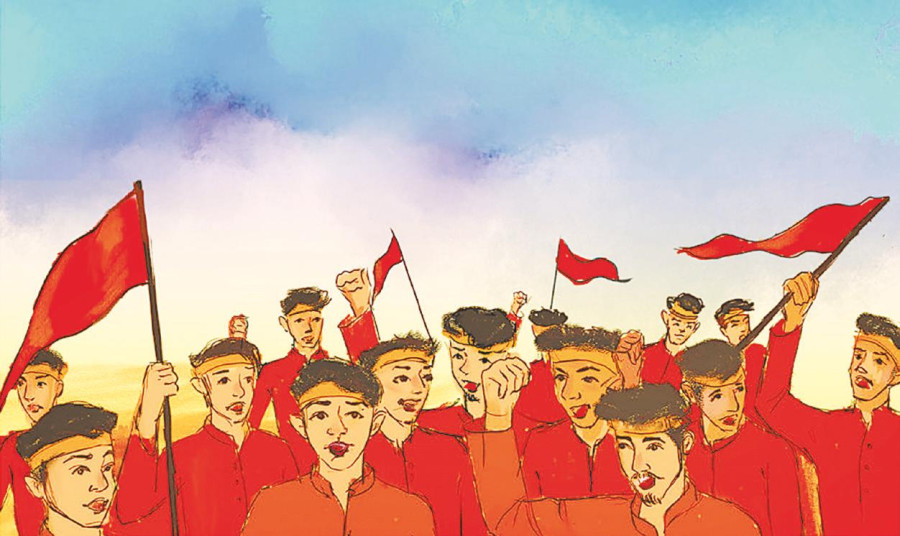Politics
Will Hinduism be an agenda in the upcoming elections?
While events in India will have an impact, religion is as yet not a big vote-puller in Nepal.
Purushottam Poudel
There is a famous saying in Nepal’s political circles: people in Kathmandu use umbrellas when it rains in New Delhi. This often means that India has had a significant influence on Nepali politics.
With the Hindu nationalist Bharatiya Janata Party (BJP) in power for almost a decade now in India, there is a general apprehension among more progressive Nepalis about whether the Hindutva wind is blowing from across the border.
Leaders across the political spectrum in Nepal will try to cash in on Hindu votes during the upcoming elections, observers and experts the Post talked to say. This prospect has been discussed widely, particularly after former prime minister and CPN-UML chair KP Sharma Oli showed interest in religious matters during his final days in power, they say.
“Religious agenda could take precedence in the upcoming elections,” said Bhaskar Gautam, a political scientist. “Given that a party that adheres to Hindutva has been in power in India, it may have an impact on Nepal’s politics. It is possible that candidates will try to exploit religious sentiments this election cycle.”
As secularism is enshrined in the Nepali constitution, one might argue that attempting to exploit religious sentiments for political advantage wouldn’t benefit leaders who endorsed the statute. But an increasing interest of Nepali politicians in religious activities has led analysts to speculate that Hindu nationalism might become a major plank in the November elections.
There’s already a key constituency in Nepal which wants to revert the country to a Hindu state. There’s the Rastriya Prajatantra Party that openly advocates the idea of reinstating monarchy in the country.
CK Lal, a political analyst who is also a columnist for the Post, said while there’s a likelihood that the parties will try to cash in on Hindu sentiments, the level of fragmentation along religious lines we see in Indian politics is unlikely to repeat here.
“On Hinduism, every political party in Nepal is in the same boat,” Lal told the Post. “Even while there’s a likelihood that Hinduism will be an agenda during the elections, it will not be a significant factor.”
The five-party ruling coalition, which has already announced an electoral alliance, is currently working on sharing seats among the parties. While the coalition is working on a seat-sharing deal, the opposition CPN-UML may be trying to attract conservative votes, Gautam said.
“The UML will team up with conservative forces whose main agenda is Hindu nationalism,” he said.
The UML is working to forge electoral partnership with the Rastriya Prajatantra Party (RPP) and the Rastriya Prajatantra Party-Nepal (RPP-N), two parties that put their faith in Hindu nationalism and the former also advocates a return to monarchy.
In 2021, Oli made headlines for his comment that Lord Ram was born in Nepal, in Chitwan district. Oli had also instructed authorities to build a Ram temple at that place. Oli's allocation of funds to construct a temple at the time, when the nation was gripped by the coronavirus pandemic, was roundly criticised. Analysts believe that the incident was but a primer to Oli’s strategy of bolstering religious themes in the upcoming elections.
Oli’s decision to gold-plate the roof of the Pashupatinath Temple and replace the silver respectacle in the sanctum sanctorum with a golden one also were perceived as Oli’s attempt to exploit religion for political benefits. As prime minister, Oli had disbursed Rs300 million for gold-plating the roof of the temple.
But is it only Oli who is trying to wield Hinduism as a political weapon? Arzoo Rana, the wife of Prime Minister Sher Bahadur Deuba, has recently taken to social media to post images of herself participating in religious activities, often accompanied by Deuba. Rarely were images of this kind released in the past. This has further fanned speculations that religious matters will find prominence in the upcoming elections.
Arzoo Deuba’s religious inclinations, however, are not new. Last year on the occasion of Raksha Bandhan, she tied a ‘Rakhi’ on the wrist of BJP foreign affairs cell convenor Vijay Chauthaiwale. In Hindu tradition, sisters tie a rakhi around their brothers’ wrists on the occasion.
Moreover, in April, Prime Minister Deuba visited India's Hindu pilgrimage destination of Varanasi while on a three-day visit to the country. Last year, three Nepali Congress leaders travelled to India to ‘strengthen’ ties with the BJP. The team was led by Prakash Sharan Mahat, spokesperson for the party considered close to Prime Minister Deuba. They also visited the holy city of Varanasi.
Pushpa Kamal Dahal, the chair of the CPN (Maoist Centre), is not far behind in forging party relations with the BJP either. On July 15, Dahal visited India at the invitation of BJP President JP Nadda.
But since the Congress and the Maoist Centre are in the coalition government, their relations with the party leading the Indian government should be taken as something regular, say political observers.
“Party-to-party connections alone may not inflame religious fervour here,” analyst Shree Krishna Aniruddha Gautam said. “But recent trends in Indian politics, such as the suppression of the Muslim population and promotion of Hinduism, may have a significant impact on our politics.”
Nepal was proclaimed a secular state in the Interim Constitution of 2006, consigning Hindu monarchy to history, and the Constitution of 2015 ratified that declaration. But given that nearly 80 percent of Nepalis believe in Hinduism, that constituency is always open for exploitation, with parties keeping a close eye on it, say analysts.
Gautam said that since the majority of our political parties do not openly embrace religion as their agenda, it would be too early to claim they will try to convert people’s religious beliefs into votes.
“But if the political parties sense ‘political benefit’ from the Indian establishment, they might very well embrace Hindu nationalism as their political agenda,” he said.




 18.12°C Kathmandu
18.12°C Kathmandu















